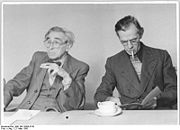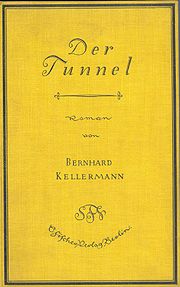
Bernhard Kellermann
Encyclopedia

Author
An author is broadly defined as "the person who originates or gives existence to anything" and that authorship determines responsibility for what is created. Narrowly defined, an author is the originator of any written work.-Legal significance:...
and poet.
Life
Bernhard Kellermann enrolled in 1899 at Munich's Technical University initially in general studies, but later focused on German literatureGerman literature
German literature comprises those literary texts written in the German language. This includes literature written in Germany, Austria, the German part of Switzerland, and to a lesser extent works of the German diaspora. German literature of the modern period is mostly in Standard German, but there...
and painting
Painting
Painting is the practice of applying paint, pigment, color or other medium to a surface . The application of the medium is commonly applied to the base with a brush but other objects can be used. In art, the term painting describes both the act and the result of the action. However, painting is...
.
Beginning in 1904 he built a reputation as a novelist with early works such as Yester and Li, and reached extraordinary success through 1939 with 183 printings.
The novel Ingeborg (1906) achieved an impressive 131 printings (until 1939).
In the years before World War I
World War I
World War I , which was predominantly called the World War or the Great War from its occurrence until 1939, and the First World War or World War I thereafter, was a major war centred in Europe that began on 28 July 1914 and lasted until 11 November 1918...
his novels were published following journeys in the United States and Japan.
His novel Das Meer (The Sea) was made into film by Peter Paul Felner and Sofar-Film-Produktion GmbH, featuring prominent film stars.
His main work was Der Tunnel
Der Tunnel (novel)
Der Tunnel is a novel by Bernhard Kellermann published in April 1913. The novel sold 100,000 copies in the six months after its publication, and it became one of the most successful books of the first half of the 20th Century. By 1939 its circulation had reached millions...
in 1913. It was highly successful for both him and his publisher, S. Fischer Verlag
S. Fischer Verlag
The German publishing house S. Fischer Verlag was founded in 1886 by Samuel Fischer in Berlin and is a leading German address for literary publications and fiction.Originally, it was renowned for naturalism literature...
: circulation exceeded one million, and the work was translated into 25 languages.
Kellermann's works became more critical of society and directly related to real-world events; his previous writings were marked with impressionism
Impressionism
Impressionism was a 19th-century art movement that originated with a group of Paris-based artists whose independent exhibitions brought them to prominence during the 1870s and 1880s...
and prose
Prose
Prose is the most typical form of written language, applying ordinary grammatical structure and natural flow of speech rather than rhythmic structure...
.
During World War I, Kellermann worked as a correspondent
Correspondent
A correspondent or on-the-scene reporter is a journalist or commentator, or more general speaking, an agent who contributes reports to a newspaper, or radio or television news, or another type of company, from a remote, often distant, location. A foreign correspondent is stationed in a foreign...
for the Berliner Tageblatt
Berliner Tageblatt
The Berliner Tageblatt or BT was a German language newspaper published in Berlin from 1872-1939. Along with the Frankfurter Zeitung, it became one of the most important liberal German newspapers of its time.-History:...
[Berlin's Daily Journal], one of Berlin's most influential newspapers, and published several war reports.
In 1920, his novel Der 9. November (The Ninth of November) appeared, which argued critically against the behavior of soldiers and officers in relation to the people. This book doomed Kellermann during the Nazi era.
Beginning in 1922 he produced numerous novella
Novella
A novella is a written, fictional, prose narrative usually longer than a novelette but shorter than a novel. The Science Fiction and Fantasy Writers of America Nebula Awards for science fiction define the novella as having a word count between 17,500 and 40,000...
s and short stories
Short Stories
Short Stories may refer to:*A plural for Short story*Short Stories , an American pulp magazine published from 1890-1959*Short Stories, a 1954 collection by O. E...
.
In 1926 Kellermann became a member of the Prussian poet academy, from which he was excluded 1933. In 1926 the divorced Lene Schneider-Kainer
Lene Schneider-Kainer
Lene Schneider-Kainer, born Lene Schneider , was a Jewish-Austrian painter, daughter of the painter Sigmund Schneider, noted for her illustration of "Lukian:Hetärengespräche...
and Kellermann left Berlin on an extended odyssey of two years, often travelling by donkey or caravan, and visiting Russia
Russia
Russia or , officially known as both Russia and the Russian Federation , is a country in northern Eurasia. It is a federal semi-presidential republic, comprising 83 federal subjects...
, Persia, India
India
India , officially the Republic of India , is a country in South Asia. It is the seventh-largest country by geographical area, the second-most populous country with over 1.2 billion people, and the most populous democracy in the world...
, Burma, Thailand
Thailand
Thailand , officially the Kingdom of Thailand , formerly known as Siam , is a country located at the centre of the Indochina peninsula and Southeast Asia. It is bordered to the north by Burma and Laos, to the east by Laos and Cambodia, to the south by the Gulf of Thailand and Malaysia, and to the...
, Vietnam
Vietnam
Vietnam – sometimes spelled Viet Nam , officially the Socialist Republic of Vietnam – is the easternmost country on the Indochina Peninsula in Southeast Asia. It is bordered by China to the north, Laos to the northwest, Cambodia to the southwest, and the South China Sea –...
, Tibet
Tibet
Tibet is a plateau region in Asia, north-east of the Himalayas. It is the traditional homeland of the Tibetan people as well as some other ethnic groups such as Monpas, Qiang, and Lhobas, and is now also inhabited by considerable numbers of Han and Hui people...
, Hongkong and China
China
Chinese civilization may refer to:* China for more general discussion of the country.* Chinese culture* Greater China, the transnational community of ethnic Chinese.* History of China* Sinosphere, the area historically affected by Chinese culture...
.
His novel The Ninth November was banned and burned publicly.
Kellermann did not flee the country and offered no resistance, but wrote dime novel
Dime novel
Dime novel, though it has a specific meaning, has also become a catch-all term for several different forms of late 19th-century and early 20th-century U.S...
s.
After the collapse of the Nazi dictatorship, Kellermann worked with Johannes R. Becher
Johannes R. Becher
Johannes Robert Becher was a German politician, novelist, and poet.-Early life:Johannes R. Becher was the son of Judge Heinrich Becher. In 1910 he tried to commit suicide with a friend; only Becher survived. From 1911 he studied medicine and philosophy in Munich and Jena...
in the Cultural Association of the GDR.
He was a member of East Germany's Volkskammer
Volkskammer
The People's Chamber was the unicameral legislature of the German Democratic Republic . From its founding in 1949 until the first free elections on 18 March 1990, all members of the Volkskammer were elected on a slate controlled by the Socialist Unity Party of Germany , called the National Front...
as well as chairmen of the Society for German-Soviet Friendship
Society for German-Soviet Friendship
The Society for German-Soviet Friendship was an East German organisation set up to encourage closer co-operation between the German Democratic Republic and the Soviet Union....
.
His commitment in the postwar years to East Germany caused a boycott of West German booksellers.
His name was forgotten.
Even shortly before his death in 1951 he rallied the writers of both German states to push for unified deliberations.
Bernhard Kellermann is buried in the New Cemetery at Potsdam. His grave is preserved.
Works

- Yester und Li (1904)
- Ingeborg (1906)
- Der Tor (1909)
- Das Meer [The Sea] (1910)
- Ein Spaziergang in Japan, Reisebericht [A Walk in Japan, Travel Report] (1910)
- Sassa yo Yassa. Japanische Tänze [Japanese Dances] (1911)
- Der TunnelDer Tunnel (novel)Der Tunnel is a novel by Bernhard Kellermann published in April 1913. The novel sold 100,000 copies in the six months after its publication, and it became one of the most successful books of the first half of the 20th Century. By 1939 its circulation had reached millions...
[The Tunnel] (1913) - Der Krieg im Westen, Kriegsbericht [The war in the West, War Report] (1915)
- Krieg im Argonnerwald, Kriegsbericht [War in the Argonner Forest, War Report] (1916)
- Der 9. November [The Ninth of November] (1920)
- Die Heiligen [The Saints], Novel (1922)
- Schwedenklees Erlebnis [Swedish Clover Experience] (1923)
- Die Brüder Schellenberg [The brothers Schellenberg] (1925)
- Die Wiedertäufer von Münster [The Anabaptists of Muenster] (1925)
- Auf Persiens Karawanenstraßen [Persian Caravan Roads], Travel Report (1928)
- Der Weg der Götter. Indien, Klein-Tibet, Siam [The Path of the Gods. India, Little Tibet, Siam], Travel Report (1929)
- Die Stadt Anatol [The city Anatol] (1932)
- Jang-tse-kiang (1934)
- Lied der Freundschaft [Songs of Friendship] (1935)
- Das blaue Band [The Blue Band] (1938)
- Meine Reisen in Asien [My travels in Asia] (1940)
- Georg Wendlandts Umkehr [George Wendlandt's Reversal] (1941)
- Was sollen wir tun? [What are we to do?], Essay (1945)
- Totentanz (1948)
- "Wir kommen aus Sowjetrußland" [We come from Soviet Russia], Report (1948)
Posthumously
- Bernhard Kellermann zum Gedenken. Aufsätze, Briefe, Reden 1945-1951 [Bernhard Kellermann in memory: Essays, letters, speeches] (1952)
Literature
- Bożena Chołuj: Deutsche Schriftsteller im Banne der Novemberrevolution 1918 [German Writers During the November 1918 Revolution]. Bernhard Kellermann, Lion Feuchtwanger, Ernst Toller, Erich Mühsam, Franz Jung. Dt. Univ.-Verl., Wiesbaden 1991. ISBN 3-8244-4039-3.
- Christa Miloradovic-Weber: Der Erfinderroman 1850-1950. Zur literarischen Verarbeitung der technischen Zivilisation. Konstituierung eines literarischen Genres [The Novel Inventor 1850–1950. To literary processing of technical civilization. Constituting a literary genre]. Lang, Bern u.a. 1989. (=Zürcher germanistische Studien [Germanistic studies of Zurich]; 15) ISBN 3-261-03995-7.
- Barbara Ohm: Bernhard Kellermann. Zum fünfzigsten Todestag des in Fürth geborenen Autors [On the fiftieth anniversary of the death of the author born in Fürth]. In: Fürther Heimatblätter [Fuerthian leaves home], 51 (2001), S. 97-135.
- Fritz Reinert: "Was uns verbindet, ist das Leiden, das Erbe und das Schicksal Deutschlands" Notizen zu zwei Potsdamer Schriftstellern (1945–1949) ["What unites us is the passion, heritage and the fate of Germany", Notes to two Potsdam writers (1945–1949)]. In: Deutschland-Archiv [German Archives], Bielefeld, 32 (1999), S. 604-613.
- Uta Schaffers: Konstruktionen der Fremde. Erfahren, verschriftlicht und erlesen am Beispiel Japan [Constructions of the foreigner. Experienced, writing light and erlesen by the example Japan]. de Gruyter, Berlin u.a. 2006. (Spectrum literature science; 8) ISBN 978-3-11-018862-2.
- Klaus Treuheit: Bernhard Kellermann. Der Moralist aus Fürth [Bernhard Kellermann. The moralist from FürthFürthThe city of Fürth is located in northern Bavaria, Germany in the administrative region of Middle Franconia. It is now contiguous with the larger city of Nuremberg, the centres of the two cities being only 7 km apart....
]. In: Visionäre aus Franken. Sechs phantastische Biographien [French Visionaries. Six Fantastic Biographies], hrsg. v. Bernd Flessner. Schmidt, Neustadt an der Aisch 2000. S. 101-112. ISBN 3-87707-542-8. - Volker Weidermann: Das Buch der verbrannten Bücher [The Book of Burned Books]. Köln: Verlag Kiepenheuer & Witsch, 2008; ISBN 978-3-462-03962-7. (Zu Kellermann Seite 93-95 [For Kellermann, see pages 93–95])

